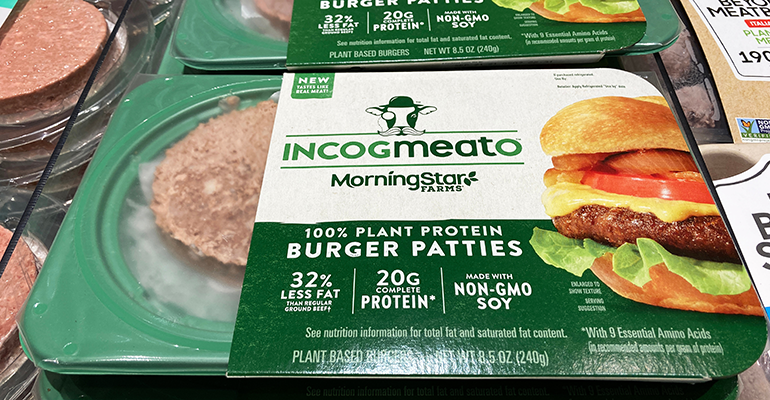News
Kellogg drops plant-based Incogmeato burger
27 Apr 2023The discontinued ready-to-cook burger was part of Kellogg’s MorningStar Farms’ Incogmeato range. It was first launched in early 2020 alongside plant-based chicken tenders and nuggets, which still continue to be sold.
Kellogg announced it was removing the Incogmeato burger from the MorningStar line up, a range of plant-based products mimicking meat, in an emailed statement. Despite dropping the burger, the US food giant promises to continue adding new plant-based products each year to offer new ways for people to enjoy veggie-filled meals.

Acquired in 1999 by Kellogg, MorningStar Farms’ plant-based line up offers a frozen, meatless spin on popular American foods such as burgers, sausage patties, chorizo crumbles, nuggets and corn dogs, according to the company website. The Incogmeato range which is part of MorningStar Farms’ brand specifically comprises of refrigerated plant-based protein products that resemble, cook, and taste like meat.
Before the launch of Incogmeato in 2019, Kellogg’s CEO, Steve Cahillane said the company was planning on releasing an imitation meat burger that would bleed on the grill. The Incogmeato burger, a 4-ounce (113 g) plant-based patty sold in the refrigerated meat section was set to compete with the likes of Impossible Foods and Beyond Meat, already gaining popularity for this realistic meaty attribute.
In the first half of 2022, supply chain disruptions with a co-manufacturer caused sales of MorningStar Farms products to fall by 10%. Late last year, Kellogg had discussed a possible sale or split off of its plant-based division MorningStar Farms but decided to keep this part of the business. This February, the US food manufacturer reported refrigerated Incogmeato plant-based meat products had performed far worse than MorningStar Farms frozen foods.
Despite the uncertainty of the plant-based market and particularly the meat alternatives category, Cahillane said on the company’s latest earnings call that the plant-based division was important and would sit under a new part of the company.
Cahillane said: “Separately, you'll recall that we were exploring strategic options for the plant-based food business, which represents about 2% of our company's net sales. Given current market conditions as well as our confidence in this business as a long-term growth vehicle, we have decided to retain it as part of global snacking company.”
An uncertain market: Are sales stagnating in the plant-based sector?
Falling sales in the plant-based category have already been reported by a number of brands in the US and UK this year. Food inflation, supply chain disruptions, higher operating, and energy costs coupled with a saturated marketplace have all been suggested as possible causes for poor sales.
Nestlé recently announced that it decided to discontinue three plant-based brands, Wunda, Garden Gourmet, and Mezeast, in the UK and Ireland due to disappointing sales. Notable plant-based brands Beyond Meat, Impossible Foods, and Oatly have all restructured, reducing company head counts in the past year.
Plant-based prepared foods manufacturer Tattooed Chef is also experiencing a fall in sales and trying to cut costs. The Californian food company recorded a loss of $38.5 million for the period ending 30 September 2022. This was far greater than the same period from the previous year when the company lost $8.2 million.
Nevertheless, in Europe there is certainly an appetite for plant-based foods where sales grew by 22% between 2020 and2022, according to a recent report from the Good Food Institute (GFI). Analysing retail sales data from NielsenIQ and covering 13 European countries, the report reveals plant-based food sales reached €5.8 billion in a period of two years.
Carlotte Lucas, senior corporate engagement manager at GFI Europe, said: “The plant-based food retail market in Europe has seen significant growth in recent years, driven by better plant-based products being brought to market [...] However, to sustain this growth, companies must continue investing in product innovation to develop plant-based products that meet consumer expectations when it comes to the key drivers of taste, price, and convenience.”